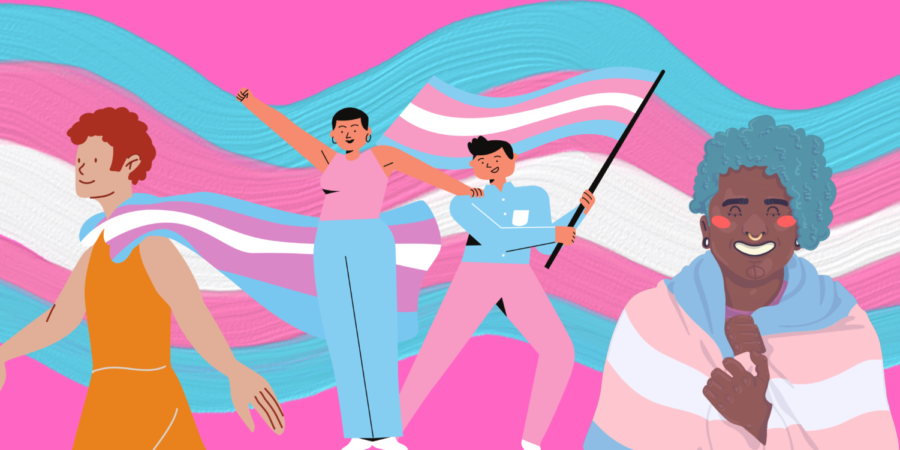Op-ed: Understanding trans grief and building trans futures (Transgender Day of Remembrance)
November 21, 2022
Content Warning: Death, mentions of suicide and murder, transphobia and other forms of oppression
I tried to write this for a cis reader but I can not. Maybe November 20 was about a day of empowerment or visibility or even just awareness, but not this day. Trans Day of Remembrance is a day of victimization, particularly the victimization of trans women of colour. The media has made it abundantly clear that trans people face higher rates of violence, suicide, and murder, and I know that if I write this article for a cis audience, I will eventually end up baring stories of trans pain just for those statistics to stick as they do for me and the larger trans community. There are other brilliant trans writers who can explain all the pain transphobia causes to an audience that is ambivalent about it but I will not. Trans Day of Remembrance is also a day of mourning, where we as trans people can express our grief and honour our dead.
Dear trans reader: I’m writing this for you; I’m trying my hand at putting our grief into a historical and political context because we deserve to know why our elders and siblings are dying.
Dear cis reader: feel free to tag along, you might learn a thing or two.
Transphobia 101: Intersectionality
Transphobia is a form of oppression that was developed next to queerphobia, built on misogyny, and originates from racist colonialism. There’s a long history to this, but in short, cultures that had frameworks for understanding gender and sex which opposed the colonial European binary would have those frameworks suppressed by colonization in order to reinforce the binary as the only legitimate concept of gender and sex (gender and sex are conflated in this framework; this conflation is known as bioessentialism). This is because enforcing strict biologically-determined gender roles on people made it much easier for capitalism (an economic system meant to accumulate wealth for the wealthiest at the expense of the disempowered poor) to work. In other words, making everyone take on the social role of either “man” or “woman” based on uncontrollable biology reinforced a system where women could be exploited for their feminized labour (cooking, cleaning, childrearing, etc.) and men could go out and make profit, positioning them economically and socially above women. Can you see the connections with colonialism, racism, misogyny and queerphobia?
Trans Grief
Grief is an emotion that comes with loss, so when I talk about trans grief, I’m describing the loss of potential futures due to transphobia, whether that be people or experiences.
The loss of people is probably what comes to mind when thinking about grief. If you are in real-life or online trans spaces, you are probably reminded of it frequently. I and most, if not all, of my trans friends have experienced suicidal ideation and so have their trans friends and so on. I feel a pang in my chest every time I hear about another trans person being murdered, another trans person who died by suicide, even just another trans suicide statistic, especially for trans youth. I think, That’s one more person in our community we’ll never be able to meet and give hope to. I wonder about my own death: If I die and return to see my funeral as a ghost, will my multiple chosen names be on my grave marker? Will I hear my real chosen pronouns in my eulogy? It’s a question of whether I’ll have my full humanity affirmed when I have no control over it anymore. What I don’t have to wonder about is if I’ll even have a grave marker, if I’ll have a funeral, or if anyone will find my body. This is because I’m lucky enough to have people that would look for me, and I’m much less likely to be murdered or have my murder dismissed by police because I’m not transfemme, Black or brown. These are the nuances of transphobia where intersectionality really matters; I’m affected by transphobia in general, but not transmisogynoir.
The loss of experiences is more abstract but probably even more common than losing people. I never had the opportunity to consider going on hormone blockers until I was too old for them. I can never talk to my parents about the transphobia I experience at school because, while I am out there, I am still closeted at home. In the same vein, I can never talk about my queer crushes or the people I have gender envy for at home or with certain friends. Every time we could not express trans joy, fear, euphoria, dysphoria, anger or hope is a time we grieve because transphobia made us let go of those moments.
Who are we mourning?
The short answer is everyone; any friends, queer family or otherwise loved ones lost to transphobia. I especially want to lift up those trans ancestors who lived, fought and reveled in trans joy to show us it was possible. Two of these ancestors I’ve been thinking about recently are Ezra Amos and Alloura Wells:
In November 2021, Ezra Amos was one of six Black youth violently arrested for supporting unhoused encampment residents (or homeless folks living in tents in a park) as they were being “evicted” by the police. This was how I had first heard of them. As far as I know, Ezra was trans nonbinary, used he/they pronouns and may have also gone by Vanessa or Nessa according to their family. In addition to being a housing and anti-police brutality advocate, he was also an artist. They were only five days from turning 23 when their body was found below a construction site. In the days leading up to his death, they interacted with TTC officials, Toronto Western Hospital officials, and police—all of which provided contradictory details shortly after their death. Remembering Our Dead, a website created for documenting trans deaths, lists Ezra’s death as a “possible suicide,” although he seemed to have plans for the near future before he died. Their family may have received more details from the police or TTC officials (as they offered a private viewing of the aforementioned interaction to the family in April) but nothing else has been shared publicly. A vigil took place on what would have been their 23rd birthday on April 5, a funeral on April 15, and a memorial on April 24 all organized by friends and family.
Alloura Wells was a mixed-race trans woman, sex worker and potential makeup artist. She was unhoused for some of her teenage and most of her adult life, and often took drugs and did survival sex work to stay alive. Her life was full of ups and downs documented in Season 10: The Village 2 of the CBC Uncover podcast. Alloura went missing in 2017 and her body was not found until months later, after her community (consisting mostly of other trans women sex workers) worked tirelessly to find her. They did everything from putting pressure on Toronto police to investigate her disappearance, to organizing physical searches when the police wouldn’t bother (as they historically have done). Someone finally contacted Monica Forrester, founder of Trans Pride Toronto and co-founder of the Meal Trans program at The 519, about finding Alloura’s body in the ravine she was known to stay in since there was a scattered encampment in that area. However, she was found farther from where people who knew her said she usually would be and there are still mysteries surrounding her death. Her murder still has not been solved after five years and is “being investigated by the cold case squad of the homicide unit” according to what a police chief told CBC Uncover, despite her allegedly abusive boyfriend never having been investigated as a suspect. A GoFundMe was created by Trans Pride Toronto and Maggie’s Toronto Sex Workers Action Project to fund flowers, reception, an urn, and financial support for the family while the funeral home and cremation were covered by the City. Layla, a childhood friend of Alloura, said to CBC Uncover: “She would’ve been an Instagram sensation for sure. [Laughs] A makeup artist, who knows? She would’ve definitely been a face of the LGBT for sure… She just had too much potential, too much talent — like sooner or later, she would’ve just found herself.”
Trans Futures
Transphobic violence is fatal and it is on the rise. With more visibility comes more overtly transphobic rhetoric, widening its audience and taking on an increasingly fascistic tone. It can feel hopeless seeing everything we’re up against and all of the people we’ve lost. I take solace in the simple fact that trans people have been here for millennia and we will never be wiped out. I hate using the term “resilient” to describe any marginalized group because it implies we simply survive all of the punches thrown at us. We are not resilient and we don’t just take punches, we punch back. Trans liberation means resistance, against transphobia and against all other forms of oppression, because we know they are tangled together at the roots. Trans futures are the potential futures we can create in the face of loss. What does a world that has defeated transphobia look like? To me, it looks like winning the fight our trans ancestors started: abolishing the policing and prison industrial complex, decriminalizing sex work and drugs and free and accessible healthcare, including all components of trans healthcare, for everyone.


vee • Nov 21, 2022 at 5:07 pm
Stunning piece of writing by a brilliant author.